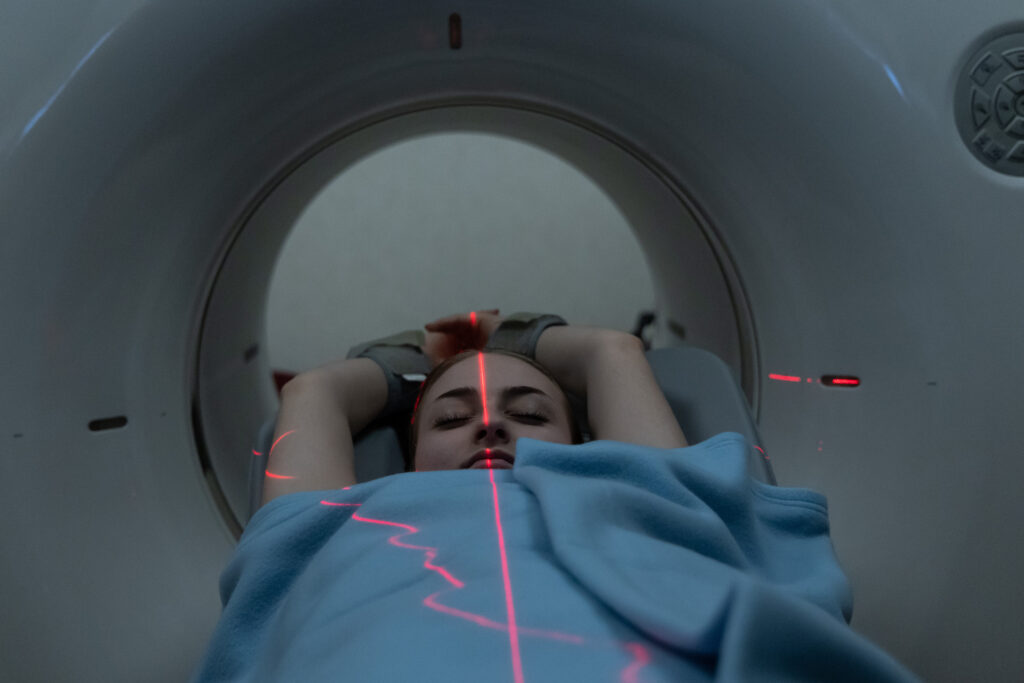Diagnostic PET Scans with Radioisotopes
What are Diagnostic PET Scans with Radioisotopes?
Diagnostic PET scans with radioisotopes are nuclear medicine imaging techniques that use Positron Emission Tomography (PET) to detect the distribution of radioisotopes (also called radiopharmaceuticals or radioactive tracers) in the body. These radioisotopes bind to specific molecules involved in biological processes, allowing these processes to be visualized and quantified in vivo. The choice of radioisotope depends on the biological process to be studied.
What is this diagnostic test used for?
Diagnostic PET scans with radioisotopes are used for a wide variety of purposes, including:
- Oncology:
- Cancer detection and staging.
- Monitoring response to oncological treatment.
- Differentiation between scar tissue and tumor recurrence.
- Neurology:
- Diagnosis and evaluation of neurodegenerative diseases (Alzheimer’s disease, Parkinson’s disease).
- Localization of epileptic foci.
- Evaluation of traumatic brain injuries.
- Cardiology:
- Diagnosis and evaluation of myocardial ischemia (lack of blood flow to the heart).
- Evaluation of myocardial viability (ability of heart muscle to recover after a heart attack).
- Infectious Diseases:
- Detection of infections and inflammations.
Benefits of high technology in Diagnostic PET Scans with Radioisotopes
Diagnostic PET scans with radioisotopes offer a series of key benefits thanks to the technology they use:
- Visualization of biological processes: Allows for visualizing and quantifying biological processes in vivo, which provides valuable information for the diagnosis and treatment of various diseases.
- Early detection: Allows for detecting diseases at an early stage, before symptoms appear.
- Diagnostic accuracy: Improves diagnostic accuracy compared to conventional imaging techniques.
- Personalized treatment: Facilitates personalized treatment, allowing treatment to be adapted to the individual characteristics of each patient.

How is the procedure performed?
The diagnostic PET scan procedure with radioisotopes generally proceeds as follows:
-
Preparation:
Preparation varies depending on the radioisotope used and the biological process to be studied. In general, you will be asked to fast for at least 4 to 6 hours before the test. It is important to inform your doctor about any allergies you have and about all medications you are taking, including over-the-counter drugs and supplements.
-
During the test:
A small amount of the radioisotope will be injected into a vein in your arm. After a waiting period (which varies depending on the radioisotope), you will lie on a table that slides into the PET scanner. Images of your body will be taken with the PET scanner. Image acquisition usually lasts between 30 and 60 minutes.
-
After the test:
You can resume your usual activities immediately after the procedure. You will be advised to drink plenty of fluids to help eliminate the radioisotope from your body.
Recommendations for the test
Remember that it is important to follow these recommendations to ensure the quality of the study and your comfort:
- Follow preparation instructions: Carefully follow all preparation instructions provided by your doctor or hospital staff.
- Inform about allergies and medications: It is important to inform your doctor about any allergies you have and about all medications you are taking, including over-the-counter drugs and supplements.
- Drink plenty of fluids: Drink plenty of fluids before and after the test.
- Inform about pregnancy or breastfeeding: If you are pregnant or breastfeeding, inform your doctor.
Are there any risks?
Diagnostic PET scans with radioisotopes are generally safe, but like any medical procedure involving radiation, they have some minimal risks to consider:
- Radiation exposure: Radiation exposure is low and considered safe. Your doctor will evaluate if the benefits outweigh the risks.
- Allergic reactions: In rare cases, allergic reactions to the radioisotope may occur.
- Discomfort at the injection site: You may experience discomfort at the injection site.
For your test to proceed smoothly, we ask that you arrive in advance of your scheduled time. This will allow us to complete the necessary administrative and clinical preparation.
Before the test, we will provide you with the Informed Consent form, a document with important information that you must read and sign.
If your appointment is for a Magnetic Resonance Imaging (MRI), it is crucial that you inform us about the presence of pacemakers, metallic objects, prostheses (including dental), tattoos, or medication infusion devices, such as insulin pumps.
These diagnostic tests are very safe, but as with any medical procedure, there is a minimal possibility of incidence.